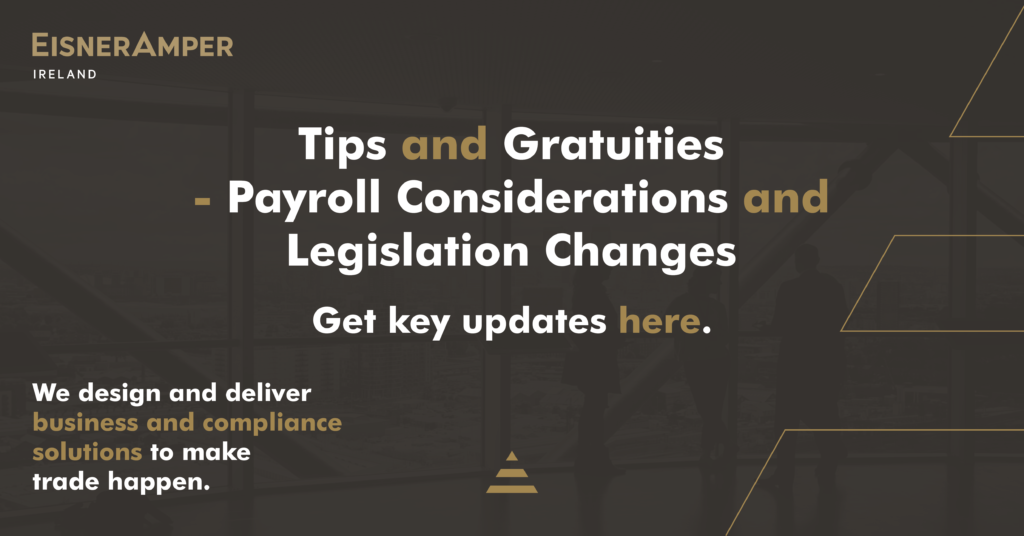

Tips and gratuities have been defined as ‘money exchanged from customer to service provider which is not legally required by the agreement for purchase of the service’ (Casey, 1998, as cited in LPC NO. 10, 2018). Generally speaking, they are relatively low value payments given by customers to workers in the service and hospitality industries in excess of the fee due for the transaction which has taken place. The frequency and value of such payments is entirely up to the customer.
Tips and gratuities are not specifically covered under the Payment of Wages Act 1991, however the Revenue Tax & Duty Manual Part 42-04-35A states that tips ‘paid to the employer and subsequently paid out to an employee should be included in pay for the income tax week or month in which they are paid out.’ This means that tips and gratuities paid to the employer and subsequently paid to the employee should be considered as pay for PAYE purposes and taxed accordingly, although the National Minimum Wage Act 2000 prevents employers from including these payments in the calculation of the National Minimum Wage. A service charge included as part of the bill should also be taxed as pay if it is paid out to an employee, but unlike tips, these payments can be included in the calculation of minimum wage.
From a wider taxation point of view, it’s worth pointing out that a service charge which is shown on the bill is subject to VAT at the reduced rate of 13.5%, however, tips and gratuities offered voluntarily by the customer are outside of the scope of VAT.
Currently there is no legislation which obliges employers to pass on any tips received by them to their staff, therefore a customer has no way of knowing if the tip they left was actually given to the intended recipient(s) and the worker has no protection if their employer chooses to keep some or all of the tips left by customers.

Proposed new measures announced by the Minister for Employment Affairs and Social Protection, Regina Doherty TD, aimed at ensuring employees receive the tips due to them and providing protections for low paid workers, are expected to include the following:
Source: welfare.ie.
It is currently unclear as to how soon the proposed measures will be introduced, however there was an announcement on 8 July 2019 which stated that the Government has given approval on a draft Heads of a Bill to amend the Payment of Wages Act 1991, which allows the Minister’s Department to draft the required legislation.
At EisnerAmper Ireland, our dedicated team of Tax professionals possess the knowledge and experience required to provide guidance and the intelligent solutions you need when either setting up, or running a business, in Ireland. We tailor our offering to your needs, ensuring you receive the best advice at the appropriate time.
Request a payroll quote or request a callback from our specialists now.
The content above is provided for general information purposes only and is not intended to provide, nor does it constitute, professional advice on any particular matter.
 +353 1 293 3400
+353 1 293 3400

 +1 212 949 8700
+1 212 949 8700
 +1 345 945 5889
+1 345 945 5889
 +65 6305 9900
+65 6305 9900